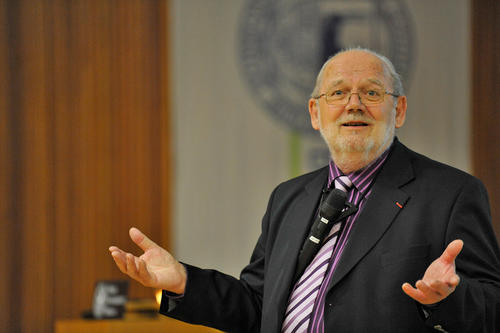10th Einstein Lecture Dahlem: Michel Brunet
In search of the Cradle of Mankind
Nov 06, 2009
Der französische Paläonthologie-Professor Michel Brunet (Collège de France-Paris) hielt 2009 die „Einstein Lecture“.
Image Credit: Bernd Wannenmacher
The idea of the origin of humankind arose quite recently, about 150 years ago, from Charles Darwin’s revolutionary theory of the origin of species. In the following decades, predecessors of present humans have been found in various parts of the Old World, and in the 1980s, the earliest bipedal hominids have been identified in the Rift Valley in East Africa in a presumed savanna environment.
Later diggings, from 1994 onwards, have unearthed much older species far west of the Rift Valley and were dated as 3.5 million years old. However, the spectacular discovery by the present author’s team of the earliest hominid yet found, Sahelanthropus Tchadensis (nicknamed Toumai), was made in 2002 in the Djurab desert (Northern Chad) and is dated as about 7 million years old.
This species displays a unique combination of primitive and modern features showing that it is not related to the chimpanzees or gorillas but clearly resembles later hominids and seems temporally close to the last common ancestor of chimpanzees and humans.
The 10th Einstein Lecture Dahlem on November 6, 2009, will also discuss the probable habitat of the Toumai with its implications and finally will proceed to the further development and spread of our ancestors through Asia and Europe in the course of time. Much of this information is derived from modern methods of genetics.
Michel Brunet (1940) studied Life Sciences at the University of Paris Sorbonne and there received his Ph.D. in paleontology in 1966. Then he went to the University of Poitiers, completed his Natural Sciences State doctorate in 1975 and became a tenured professor of paleontology in 1989. From 1976 on, his field researches concentrated on hominid paleontology in Afghanistan and Iraq. Due to the dangerous political situation in both countries, Michel Brunet turned his attention to Africa where he decided to explore western Africa for ape and hominid fossils. In 1995 he described a new hominid dated to 3.5 million years, the first Australopithecin known west of the Rift Valley. In 2002 he published the first hominid yet found (7 mill. years). He is currently Professor of the Collège de France, Chaire de Paléontologie humaine, in Paris. He received a large number of Honors, among them: Chevalier dans l’Ordre de la Légion d’honneur, Philip Morris Scientific Prize 1996, and is 2003 Laureate of the Dan David Prize.

